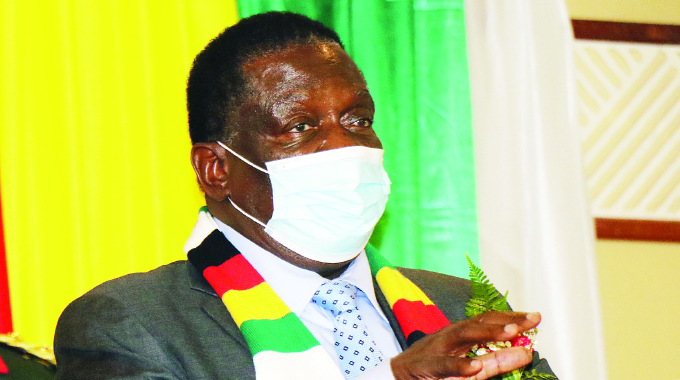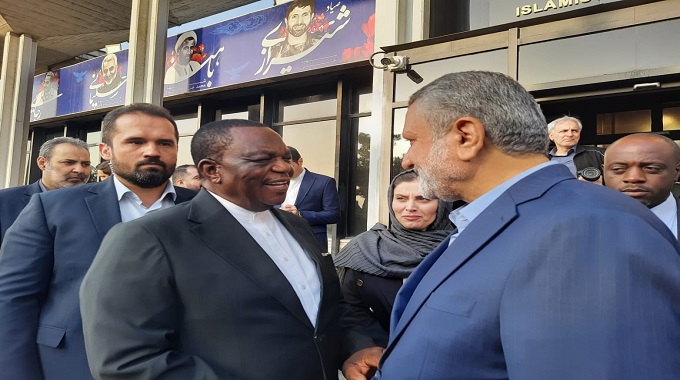‘Harness indigenous languages for development’

Mashudu Netsianda in VICTORIA FALLS
The nation has been implored to harness indigenous languages as a resource to facilitate social transformation, human capital development and wealth creation.
President Mnangagwa said this while officiating at the ongoing National Languages Conference in Victoria Falls yesterday.
Running under the theme; “Redefining the role of Zimbabwean languages for national development towards Vision 2030 and beyond”, the conference seeks to define in detail the role and place of all officially-recognised and not yet recognised indigenous languages in national development as well as the promotion, preservation and conservation of cultural heritage.
Zimbabwe has 16 official languages, namely Chewa, Chibarwe, English, Kalanga, Khoisan, Nambya, Ndau, IsiNdebele, Shangani, Xhosa, Sign Language, Sesotho, Tonga, Tswana, Venda and ChiShona adopted in the 2013 Constitution.
Cabinet recently adopted the Principles for the Languages Bill, which underpin the need for the promotion of multilingualism, respect of language rights and linguistic preference as fundamental to the process of nationalism, development of augmentative and alternative communication systems for people with impediments that inhibit communication.
It also recognises and promotes languages as cultural wealth. The Bill also seeks to see the establishment and maintenance of institutional structures, such as the National Languages Board, the National Languages Fund, and the Languages Database.
President Mnangagwa said indigenous languages are critical in terms of improving social cohesion.
He implored citizens to use indigenous languages to fight corruption and promote unity, love and peace and a non-violence culture as the country moves towards next year’s harmonised elections.
The President said the broader use of indigenous languages, including sign language, should trigger active participation of communities across the length and breadth of the country, towards nation building and socio-economic development programmes, from ward level, upwards.
“The languages of our people are a resource that should be harnessed, not only to ensure cultural diversity and inter-cultural dialogue, but to also facilitate social transformation, human capital development and wealth creation.
“As you are aware, indigenous languages are critical for improving social cohesion as they give our communities a sense of inclusivity while nurturing national cultural identities, pride and the dignity of indigenous people,” said President Mnangagwa.
“Our languages are also an indispensable cultural heritage which is necessary for unity, education, economic wellbeing and mass participation.”
President Mnangagwa said in light of the national development agenda, guided by the development philosophy “Nyika inovakwa nevene vayo/Lizwe lakhiwa ngabaninilo”, indigenous languages must thus, effectively be deployed as a vital cog in the formulation, implementation and monitoring of all national development policies, programmes and activities
“Similarly, increased production and productivity in sectors such as agriculture, mining and manufacturing among others, should be promoted through the use of our own indigenous languages,” he said.
The President said the National Languages Indaba will also facilitate the mobilisation of stakeholders and requisite resources, for the preservation, revitalisation and promotion of indigenous languages.
“After all, it is through language that we understand and adapt to the ever-changing world around us. I am also encouraged by the fact that delegates to this conference are drawn from a wide range of stakeholders, including traditional leaders, experts in culture and indigenous languages, cultural heritage historians, civic society, linguists as well as writers and researchers from both public and private institutions,” he said
“These together with those in the cultural creative industries, the clergy, politicians, parliamentarians and the media are an impressive ensemble.”
President Mnangagwa said the multi-stakeholder synergy demonstrated during the ongoing indaba, is a giant leap forward which should propel the development of an all-encompassing roadmap that will culminate in the National Languages Policy and the subsequent enactment of a National Languages Act that leaves no one and no place behind.
President Mnangagwa said the revitalisation of indigenous languages is essential for ensuring the continuation and transmission of culture, customs and history.
“To this end, the family of a child is the first classroom and parents are the child’s first teacher. I therefore, call upon parents and guardians to set a good example by teaching our children their indigenous languages. This will also help reinforce our cultural norms, which emphasize the respect of oneself and others, including elders, community and the environment,” said President Mnangagwa.
On its part, President Mnangagwa said Government will continue to render the necessary support and resources for the implementation of various policies, programmes and legislation that build capacity around national languages and understanding of the nation’s cultural heritage.
This includes the preservation, revitalisation and mainstreaming of linguistic diversity in Zimbabwe.
“To date, the Government continues strengthening our education systems through increasing the number of language professionals, especially in the less commonly taught languages and also availing teaching books in indigenous languages.
“Equally important is integrating training of indigenous languages for professionals in the various sectors of the economy, inclusivity and social cohesion,” said President Mnangagwa.
“It is therefore my expectation that this conference will contribute to the building of a solid foundation which guarantees a future where all citizens are able to articulate their thoughts, values, experiences and customs in their respective languages.”
President Mnangagwa said it is encouraging to note that the use of indigenous languages, including their digitalisation will ensure their survival, revival and continuity through generations.
“This must ultimately lead to an enhanced sense of self-worth, national pride and greater appreciation of the fact that as a nation, we are diverse but one people. I exhort delegates to emerge from this forum with robust strategies that will guarantee the preservation of our indigenous languages,” he said.
The President said mechanisms to mainstream indigenous languages into the national development initiatives and nurturing citizens to be consciously proud of using their indigenous languages, must be equally prioritised.
“Equally, we are committed to keeping our languages alive by leaving no language behind. To this end, my Government has ensured that the translation of national documents such as the Constitution, National Development Strategy 1 and Covid-19 information, education and other communication materials, into 16 national languages,” said President Mnangagwa.
The conference has brought together legislators, members of the judiciary, Government departments and agencies, civic organisations, traditional leadership, African indigenous languages experts, linguists, cultural experts and the academia.
Others include the media, players in the cultural and creative industries and church leaders.










Comments